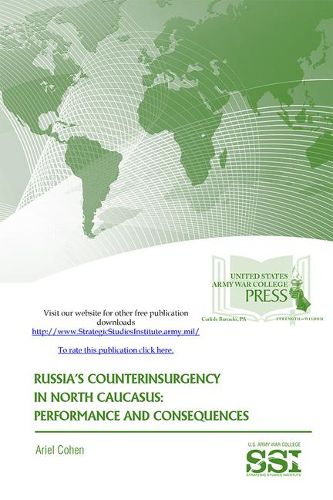Readings Newsletter
Become a Readings Member to make your shopping experience even easier.
Sign in or sign up for free!
You’re not far away from qualifying for FREE standard shipping within Australia
You’ve qualified for FREE standard shipping within Australia
The cart is loading…






The North Caucasus region has been a source of instability for the past several centuries. Most recently, Chechen aspirations to achieve full independence after the break-up of the Soviet Union led to two disastrous wars.
While the active phase of the Chechen conflict ended in year 2000–more than a decade ago– the underlying social, economic, and political issues of the region remain. A low-level insurgency continues to persist in the North Caucasus region, with occasional terrorist attacks in the Russian heartland. . There are few reasons to expect any substantial improvement in the situation for years to come. Chechnya functions as a de facto independent entity; Islamist influence in Dagestan is growing, terror attacks continue, and the rest of the North Caucasus requires massive presence of Russian security services to keep the situation under control. Preventing the North Caucasus from slipping back into greater instability requires tackling corruption, cronyism, discrimination, and unemployment–something the Kremlin has so far not been very willing to do. Small wars in the Caucasus resonated as far away as Boston, MA, and more international attention and cooperation is necessary to prevent the region from blowing up.
This monograph examines the issues behind the continuing low-level insurgency in the Russian North Caucasus. It begins by analyzing the history of the bloody and contentious relations between the Russian and the North Caucasus Muslim nations, focusing specifically on the process of subjugating the region by the Russian Empire; the Caucasus wars of the 19th century; and the two Chechen wars and their aftermath, beginning in 1994 until today.
$9.00 standard shipping within Australia
FREE standard shipping within Australia for orders over $100.00
Express & International shipping calculated at checkout
The North Caucasus region has been a source of instability for the past several centuries. Most recently, Chechen aspirations to achieve full independence after the break-up of the Soviet Union led to two disastrous wars.
While the active phase of the Chechen conflict ended in year 2000–more than a decade ago– the underlying social, economic, and political issues of the region remain. A low-level insurgency continues to persist in the North Caucasus region, with occasional terrorist attacks in the Russian heartland. . There are few reasons to expect any substantial improvement in the situation for years to come. Chechnya functions as a de facto independent entity; Islamist influence in Dagestan is growing, terror attacks continue, and the rest of the North Caucasus requires massive presence of Russian security services to keep the situation under control. Preventing the North Caucasus from slipping back into greater instability requires tackling corruption, cronyism, discrimination, and unemployment–something the Kremlin has so far not been very willing to do. Small wars in the Caucasus resonated as far away as Boston, MA, and more international attention and cooperation is necessary to prevent the region from blowing up.
This monograph examines the issues behind the continuing low-level insurgency in the Russian North Caucasus. It begins by analyzing the history of the bloody and contentious relations between the Russian and the North Caucasus Muslim nations, focusing specifically on the process of subjugating the region by the Russian Empire; the Caucasus wars of the 19th century; and the two Chechen wars and their aftermath, beginning in 1994 until today.